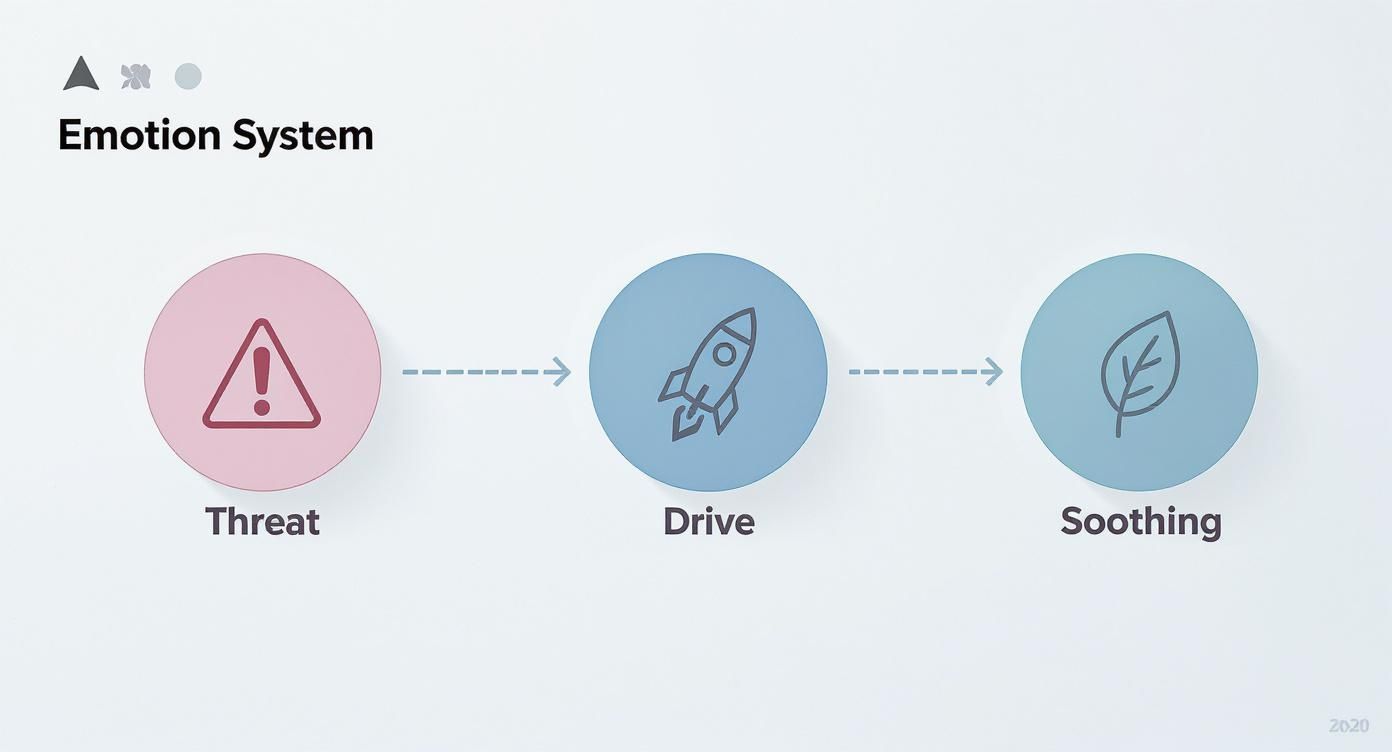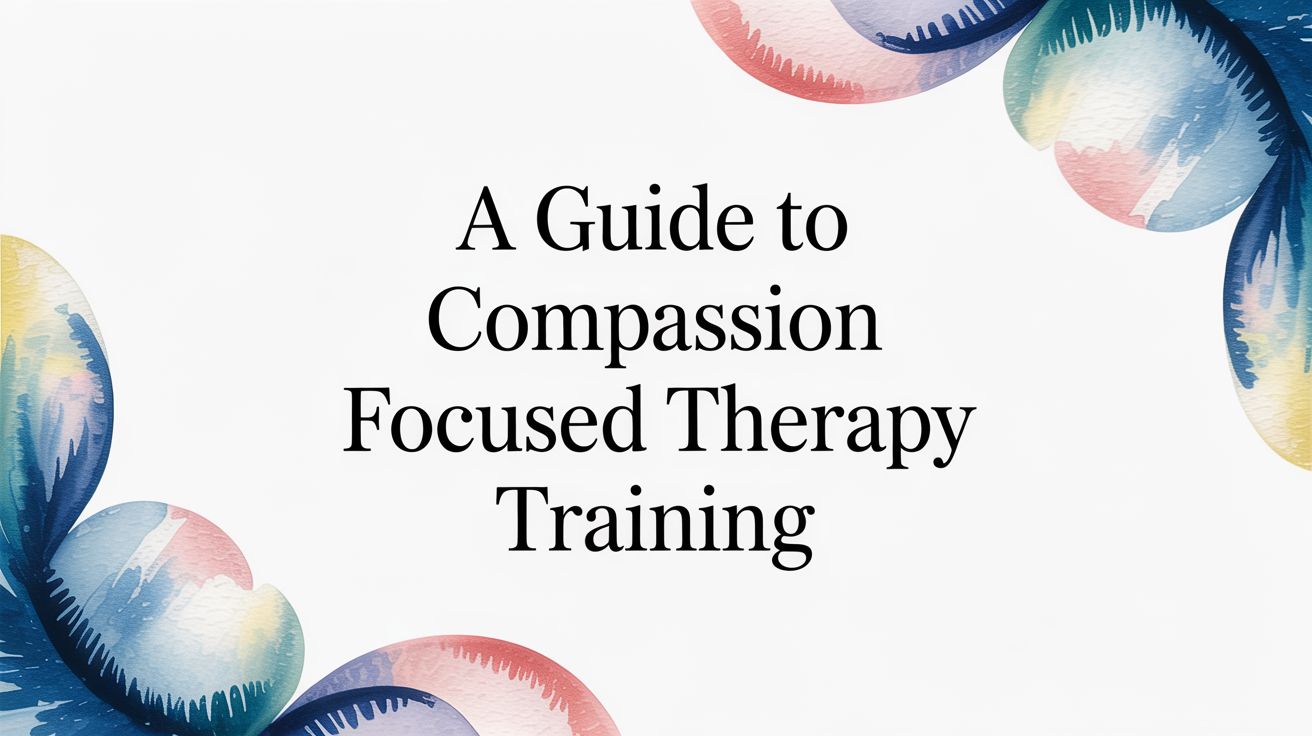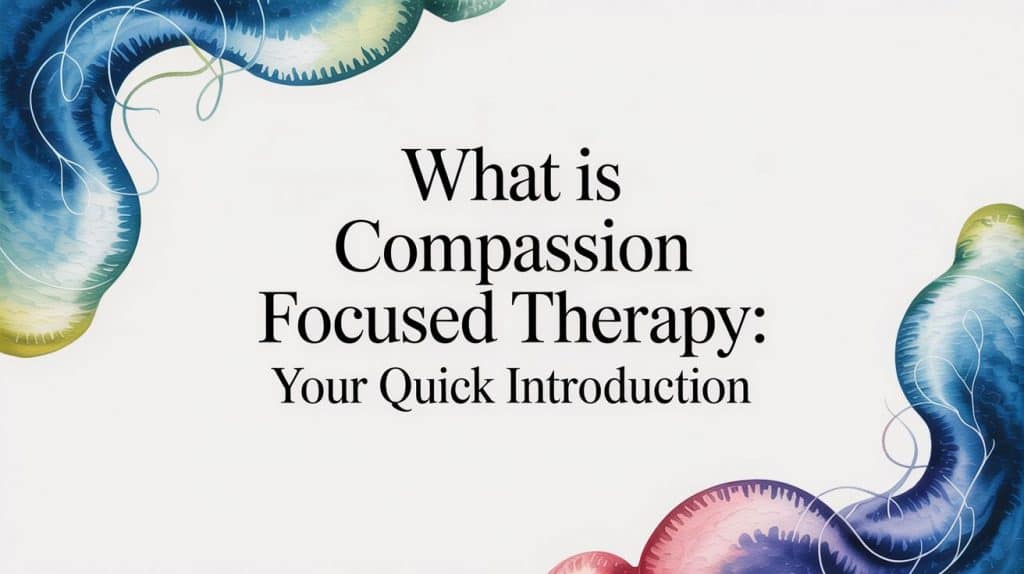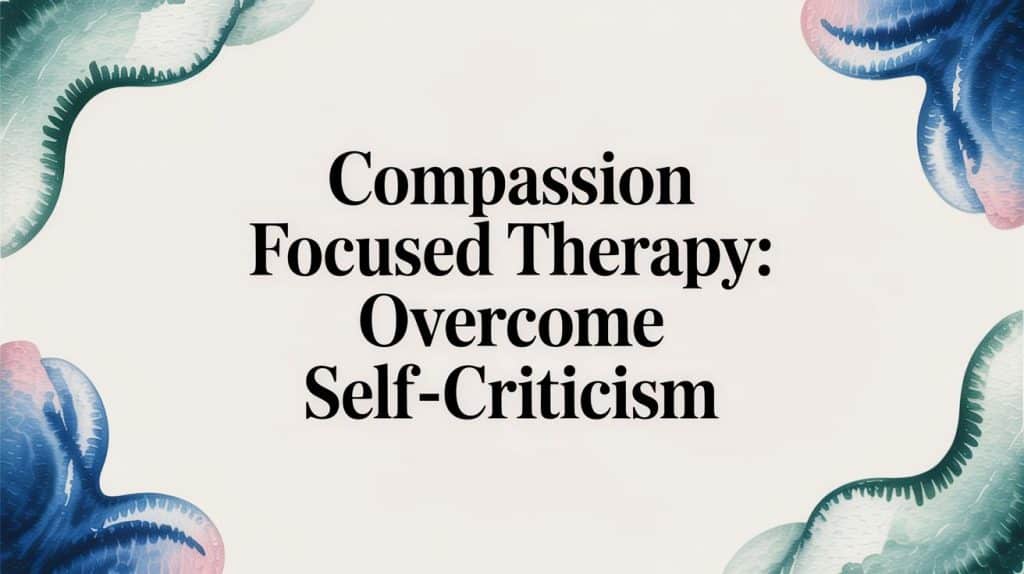Compassion Focused Therapy (CFT) training is, at its heart, a way for mental health professionals to learn how to cultivate a deep sense of compassion—both for their clients and, just as importantly, for themselves. It’s an approach packed with evidence-based tools specifically designed to help people work through deeply ingrained patterns of shame and self-criticism.
Think of it as learning to build and tap into an inner wellspring of strength, wisdom, and genuine warmth.
What Is Compassion Focused Therapy Training?
For therapists, counsellors, and other healthcare workers, CFT training offers a powerful and deeply humanising framework to enhance their practice. It's not about replacing traditional cognitive or behavioural methods, but rather going a level deeper. We explore the core emotional systems that really drive our thoughts and actions, which is particularly vital for clients who feel hopelessly stuck in cycles of self-attack.
A huge part of CFT training is about getting to grips with why our minds work the way they do. It pulls together insights from evolutionary psychology, modern neuroscience, and attachment theory to paint a clear picture of how our brains are fundamentally wired for survival. This wiring can, unfortunately, lead to a relentless inner critic that causes immense distress. The training gives you the language and concepts to help clients see that this isn't some personal failing on their part—it's just a common, albeit painful, feature of our "tricky brains."
Understanding the Three Systems of Emotion
One of the first and most foundational ideas you'll encounter is the three systems model of emotion. It's a brilliantly simple way to understand the complex world of our feelings:
- The Threat System: This is our internal alarm bell. Its job is to sniff out danger and fire off feelings like anxiety, anger, and disgust to keep us safe. It’s our survival instinct in action.
- The Drive System: This is our motivation engine. It’s the part of us that pushes us to seek out resources, chase goals, and find pleasure. It’s responsible for those feelings of excitement and a job well done.
- The Soothing System: This system is all about feeling content, safe, and connected. It comes online when we feel cared for and not under threat, allowing us to rest, recover, and feel at peace.
For so many clients, especially those wrestling with high self-criticism, their threat system is constantly on high alert while their soothing system is underdeveloped and hard to access. CFT training gives you the practical skills to help them bring these systems back into a healthier balance.
The aim isn't to get rid of difficult feelings altogether—that’s impossible! Instead, it’s about building the inner capacity to soothe and support ourselves when those feelings show up. And we know this works. For example, a 2016 study with UK healthcare professionals found that even a brief introduction to CFT led to significant boosts in their own self-compassion.
The goal of CFT is not to simply challenge critical thoughts, but to develop an entirely different way of relating to oneself—one grounded in the courage, wisdom, and commitment of compassion.
Key Skills You Will Learn
This isn't just a theoretical training; it's intensely practical. You’ll spend a lot of time on experiential exercises that you can use with clients right away, and just as importantly, for your own self-practice.
Here's a look at what you can expect to cover in an introductory programme, like the ones we offer through our compassion focused therapy training courses.
Key Components of Foundational CFT Training
| Component | Learning Objective |
|---|---|
| Evolutionary Model of Mind | To understand the 'tricky brain' and normalise clients' struggles with self-criticism and shame. |
| Three Systems of Emotion | To identify and explain the threat, drive, and soothing systems to clients. |
| Compassionate Mind Training | To guide clients in experiential exercises like soothing rhythm breathing and compassionate imagery. |
| Working with Self-Criticism | To help clients understand the function of their inner critic and develop a compassionate response. |
| Developing the Compassionate Self | To cultivate an inner sense of a wise, strong, and caring self to navigate difficulties. |
By the end of a foundational course, you'll have a solid grasp of these core components, giving you the confidence to start integrating CFT into your work.
Understanding the Core Principles of CFT
Compassion Focused Therapy training isn't just about learning techniques to manage symptoms. It goes much deeper, exploring the fundamental science of why our minds work the way they do. One of the first concepts you'll encounter is the idea of our 'tricky brain'. This isn't some dry, academic term; it's a profoundly compassionate way to frame our internal struggles.
Evolutionarily speaking, our brains are ancient survival machines. They were wired to spot threats, find food, and stick with the tribe—all designed to keep us alive in a harsh and dangerous world. The catch? That old wiring hasn't had a software update for modern life.
This means we’re all walking around with a built-in negativity bias. Our brains are naturally programmed to scan for problems, jump to worst-case scenarios, and cling to negative memories far more tightly than positive ones. It's this default setting that often fuels chronic anxiety, worry, and that relentless inner critic who's always ready to point out our flaws. CFT training helps us see this not as a personal failing, but simply as a feature of being human.
By understanding that our brains are built for survival, not happiness, we can stop blaming ourselves for our struggles. This shift from shame to understanding is the first crucial step towards cultivating self-compassion.
The Three Systems of Emotion Regulation
So, how do we manage this tricky brain? CFT introduces a brilliantly simple yet powerful model: the three systems of emotion regulation. You can think of them as a set of internal traffic lights, each with a very specific job. A huge part of compassion focused therapy training is learning how to bring these systems into a healthier balance.
The infographic below gives a great visual summary of these three core emotional systems that CFT works to rebalance.

As you can see, the threat, drive, and soothing systems each have distinct roles. A key aim of CFT is to deliberately strengthen the soothing system so it can better regulate the other two.
For many people caught in cycles of shame and self-criticism, their threat system (the red light) is constantly flashing, while their soothing system (the green light) barely gets a look-in.
-
The Threat System: This is our brain's alarm bell, built to protect us from danger. It fires up feelings like anxiety, anger, and disgust to get our attention. It’s absolutely vital for survival, but when it’s overactive, it traps us in a state of high alert and chronic stress.
-
The Drive System: This is our internal engine, pushing us to achieve goals, seek rewards, and get things done. It's the source of feelings like excitement, pleasure, and anticipation. While essential, an over-reliance on the drive system can easily lead to burnout and a nagging feeling of never being good enough.
-
The Soothing System: This is our system for rest, recovery, and connection. It’s switched on when we feel safe, cared for, and content. Linked to the release of hormones like oxytocin, the soothing system is crucial for emotional balance, yet it's often the most neglected and underdeveloped of the three.
The Three Flows of Compassion
Building on this model, CFT training then introduces the concept of the three flows of compassion. True compassionate living isn't just about being nice to others; it's a dynamic skill that has to move in multiple directions.
-
Compassion Flowing Out: This is the one we're most familiar with—the empathy, kindness, and support we offer to other people. It involves recognising their struggles and having a genuine wish to help.
-
Compassion Flowing In: This is our ability to receive compassion from others. For many of us, this can be surprisingly difficult. It requires us to feel vulnerable and to believe, deep down, that we are actually worthy of receiving kindness and care.
-
Self-Compassion: This is about turning that same warmth and understanding inward, especially when we're struggling, feeling inadequate, or have made a mistake. For people with a harsh inner critic, this is often the most challenging flow to cultivate.
These foundational principles—the tricky brain, the three emotional systems, and the three flows of compassion—are the bedrock of CFT. They provide a non-blaming, science-informed map that explains why we suffer and offers a clear, practical path towards building the inner resources we need to heal and flourish.
Navigating CFT Training Levels in the UK
Starting your journey with compassion focused therapy training is a bit like learning to navigate a rich and detailed landscape. It’s not a one-off event; it's a progressive path with distinct stages, each one designed to build your confidence and deepen your clinical skills. Here in the UK, this pathway is really well-established, guiding you from the first principles right through to advanced, specialised practice.

The image above shows the homepage of the Compassionate Mind Foundation, the central hub for CFT in the UK. They often list accredited training events, and this structured approach is key to ensuring practitioners get a thorough, high-quality education as they develop.
The Foundational Stage: Your Starting Point
Your first step into CFT will almost always be a foundational or introductory course. These are all about giving you a solid grounding in the core theory and key practices. Think of it as learning the alphabet of compassion before you can start writing sentences.
You'll explore the evolutionary model of our 'tricky brain' and get to grips with the three emotional regulation systems. What's crucial here is that this stage is highly experiential. You won’t just learn about compassionate mind training; you’ll be practising it yourself through guided exercises like soothing rhythm breathing and compassionate imagery. The goal is to build your own felt sense of compassion first, so you can then guide your clients from a place of genuine, authentic understanding.
Intermediate and Advanced Skills: Deepening Your Practice
Once you’ve got the fundamentals down, the next level involves advanced skills workshops. This is where you really move from understanding the 'what' and 'why' to mastering the 'how'. These courses focus on applying CFT to specific clinical presentations and tackling the common challenges that come up in therapy.
At this stage, you'll learn how to:
- Work with Blocks to Compassion: Uncover and gently address the fears, blocks, and resistances that stop clients (and, let's be honest, ourselves) from accessing compassion.
- Deepen Chair Work: Use multi-chair techniques to help clients externalise their inner critic and build up their compassionate self.
- Master Formulation: Develop a detailed, CFT-based case formulation to guide your therapeutic work with real precision and care.
This level is all about building your fluency and confidence. You’ll find yourself in more intensive role-plays, getting detailed feedback, and learning to artfully tailor CFT interventions to the unique needs of each person you work with.
Specialised and Expert-Level Training
For those of you wanting to specialise even further, there are all sorts of expert-level courses available. These workshops dive deep into applying CFT to specific and complex areas, such as trauma, eating disorders, psychosis, or even working with groups. This is where you really refine your expertise and can become a specialist practitioner.
This structured progression is reflected in how professionals in places like the NHS engage with CFT. For instance, an evaluation at Leeds Teaching Hospitals NHS Trust showed that around 33% of clinical staff sought external CFT training. Of those, 25% attended one or two foundational and advanced courses, while a smaller group pursued up to seven specialised courses in areas like leadership and trauma-focused CFT. It really highlights how this training pathway supports ongoing professional development, from novice all the way to expert. You can learn more about these findings on CFT training in the NHS.
"The journey through CFT training is a dual one. You are not only learning a set of techniques to use with others, but you are also embarking on a personal practice that will inevitably shape you as a therapist and as a person."
Ultimately, this tiered approach allows you to build your skills systematically. Each level prepares you for the next, ensuring you develop not just theoretical knowledge, but the practical wisdom and personal embodiment of compassion needed to facilitate profound change in your clients. It's a comprehensive map for professional growth.
Who Should Consider CFT Training?

While the idea of compassion feels universal, compassion focused therapy training is built specifically for professionals in the mental health and healthcare fields. Think of it as a specialised lens that helps you see and work with deep-seated emotional pain in a new way, making it an incredibly valuable addition to your clinical toolkit.
This training is a perfect fit for registered and accredited professionals who want to go deeper with clients who feel utterly stuck. It’s for the psychologists, psychotherapists, counsellors, and psychiatrists who regularly sit with the corrosive effects of shame and self-criticism.
Have you ever had a client who can logically agree their thoughts are unhelpful, but they still feel worthless deep down? If you’ve found that traditional cognitive or behavioural approaches sometimes don't quite land with these clients, CFT might just be the missing piece. It gives you a way to work directly with the emotional systems that keep those painful patterns locked in place.
The Professionals Who Benefit Most
Learning CFT isn't just about collecting a new set of techniques; it's about fundamentally shifting how you conceptualise your client's distress. This approach tends to resonate deeply with practitioners who want to foster a more validating, non-blaming, and genuinely human presence in the therapy room.
Here are just a few of the professionals who find CFT training particularly enriching:
- Clinical and Counselling Psychologists looking to integrate a robust, evidence-based approach for complex cases involving trauma, personality disorders, and mood disorders.
- Psychotherapists and Counsellors wanting to sharpen their skills in navigating the tricky terrain of shame, self-criticism, and attachment wounds.
- Psychiatrists who are interested in a psychological model that beautifully complements medical treatment by getting to the emotional heart of mental health conditions.
- Nurses, Social Workers, and Occupational Therapists working on the front lines who need practical, effective tools to manage emotional distress and prevent burnout.
For us as practitioners, CFT can be a profoundly rewarding path. It doesn't just equip you with powerful clinical tools; it encourages your own practice of self-compassion, which is one of the most powerful antidotes we have to professional burnout and vicarious trauma.
The Client Groups Where CFT Really Shines
CFT was originally developed by Paul Gilbert for individuals wrestling with intense shame and self-criticism, and this remains its sweet spot. The approach is uniquely wired to help clients whose harsh inner critic is the main driver of their suffering.
This means it's incredibly effective for individuals facing a wide range of difficulties:
- Chronic Depression and Anxiety, where relentless self-critical thoughts keep the cycle of low mood and worry going.
- Complex Trauma, where feelings of shame and self-blame are so often a roadblock to healing.
- Eating Disorders, which are frequently fuelled by intense body shame and a punishing internal voice.
- Personality Disorders, where struggles with self-identity and emotional regulation are front and centre.
But its applicability is broad. A systematic review looking at group CFT sessions in UK NHS services found it was highly acceptable to clients with all sorts of different struggles. The key takeaways were significant jumps in self-compassion and better emotional regulation, proving just how versatile it is. You can explore the full review on group CFT effectiveness to see the data for yourself.
To make this real, picture a client who has battled social anxiety for years. Intellectually, they know people probably aren't judging them, but they can't shake that gut-level feeling of being flawed. A CFT-trained therapist helps them understand this feeling isn't a character flaw, but a sign of an overactive threat system.
Instead of just disputing the thought, you'd guide them through compassionate imagery or soothing rhythm breathing to deliberately activate their brain's soothing system. This creates a new, felt experience of safety and self-acceptance, from the inside out. That’s the practical, life-changing power of CFT.
How to Choose the Right CFT Training Course
Investing in your professional development is a big step, and picking the right compassion focused therapy training is vital. You want to make sure you’re getting real value for your time and money, but with so many providers and formats out there, it can feel a bit overwhelming. This guide is designed to give you a clear framework for finding a high-quality programme that genuinely fits your clinical needs, learning style, and career goals.
Think of it like choosing a guide for a mountain expedition. You wouldn't just pick anyone. You’d want someone with the right credentials, proven experience on that specific terrain, and a teaching style that gives you confidence. The same logic applies here. The aim is to find a course that doesn't just throw information at you, but truly helps you cultivate your skills and confidence as a CFT practitioner.
Key Questions to Ask Any Training Provider
Before you sign up for anything, it’s so important to do your homework. A good, reputable provider will be transparent and more than happy to answer your questions. It’s helpful to arm yourself with a checklist to make sure you’re covering all the important bases.
Here are the essential questions I always recommend asking:
- Is the course accredited or recognised? Look for training that is recognised by the Compassionate Mind Foundation, which is the main organisation for CFT here in the UK. This is a key seal of quality and shows the course adheres to the core model.
- Who are the trainers? Dig into their clinical background a bit. Are they experienced CFT therapists, supervisors, and trainers? You want to learn from people who are actively practising and contributing to the field, not just teaching theory.
- What is the balance of theory and practice? Good CFT training is highly experiential. You need to feel it in the room. Ask about the ratio of classroom-style teaching to practical exercises, role-plays, and personal practice. You should be doing CFT, not just hearing about it.
- What post-course support is available? The learning doesn't stop when the workshop ends. Far from it. Ask about what happens next—are there opportunities for ongoing supervision, peer support groups, or follow-up sessions? This is absolutely vital for integrating new skills into your day-to-day work.
Choosing a training provider is an investment in your clinical future. Prioritise trainers with deep, lived experience of CFT, as they teach not just from the textbook, but from years of authentic practice in the therapy room.
Comparing CFT Training Formats
The way a course is delivered can make a huge difference to your learning experience. These days, we have more options than ever, and each one has its own set of pros and cons. Taking a moment to understand them will help you pick the format that best suits your life and how you learn best.
Thinking about what works for you is key. Below is a simple table to help you weigh up the different delivery methods.
| Format | Advantages | Considerations |
|---|---|---|
| In-Person | Rich, immersive learning with direct interaction, live demonstrations, and easy networking with peers. Ideal for hands-on, experiential work. | Requires travel, accommodation costs, and taking time away from your practice. Less flexible than other options. |
| Online (Live) | Highly accessible and convenient, with no travel costs. Allows for real-time interaction, Q&A, and breakout room exercises. | Can lead to 'Zoom fatigue'. Lacks the embodied presence and informal networking of in-person events. |
| Hybrid/Blended | Combines the flexibility of online learning with the depth of in-person sessions, offering a balanced approach. | Can sometimes feel disjointed if not well-integrated. Requires commitment to both online and face-to-face components. |
For instance, the various compassion focused therapy training courses with Dr Chris Irons offer different formats precisely to meet these diverse professional needs, from online workshops to more intensive in-person experiences. The best choice really comes down to what you need right now.
Planning Your Investment
Finally, we have to talk about the practicalities of cost and time. In the UK, a foundational CFT course might cost anywhere from a few hundred pounds for a two-day workshop to over a thousand for a more intensive, multi-part programme. Remember to factor in potential extras like travel, a hotel, and any required reading materials.
The time commitment can also vary widely, from a single weekend workshop to a series of modules spread over several months. It’s important to be realistic about what you can manage, both financially and chronologically. The goal is to choose a path that feels sustainable and enriching, not one that adds more stress to your plate.
Starting Your CFT Journey With Key Resources
So, you’ve got a handle on what compassion focused therapy training involves. The big question now is, where do you actually begin? Knowing where to find credible courses and resources is the first real step on the path. It all starts with connecting to the key figures and organisations at the very heart of CFT.
For anyone in the UK, your first port of call should absolutely be the Compassionate Mind Foundation. This is the official hub for all things CFT, founded by the model's creator, Professor Paul Gilbert. It's an incredible source of information, offering lists of accredited training events and a directory of qualified therapists and supervisors.
Essential Reading and Learning
Before you even book a course, getting to grips with the foundational texts is invaluable. I always recommend people start by reading Professor Paul Gilbert’s work, like "The Compassionate Mind" and "Mindful Compassion".
These books give you a really deep appreciation for the evolutionary and neuroscientific ideas that underpin the entire model. And they’re not just for therapists – they're written in a way that’s accessible and profoundly insightful for anyone.
When you’re ready to translate that theory into practice, exploring the work of Dr. Chris Irons is a fantastic next step. As a world-renowned CFT trainer and author, he has a real knack for bringing the concepts to life through his online and in-person workshops. You can explore a variety of specialised CFT training courses on his website, tailored for different levels of experience.
"True learning in CFT comes from both intellectual understanding and embodied practice. The best resources will guide you in both, helping you cultivate compassion not just as a concept, but as a felt experience."
Curated Resources for Your Development
Beyond the core texts and formal training, there's a whole ecosystem of resources out there to support your learning as you go. Subscribing to newsletters from key CFT organisations or following prominent trainers on professional networks is a great way to stay in the loop on new research, webinars, and workshops.
Here are a few practical next steps to keep the momentum going:
- Explore the Compassionate Mind Foundation website. Dive into the articles, research links, and accredited training lists they offer.
- Watch introductory videos and webinars from key figures like Paul Gilbert and Chris Irons. Hearing them explain the concepts directly can be a game-changer.
- Join a peer supervision group once you’ve done some initial training. It’s a brilliant way to discuss cases with colleagues and really deepen your application of CFT.
Tapping into these resources gives you a structured and supportive path, making sure you feel well-equipped to bring compassion into your clinical work in a meaningful way.
Frequently Asked Questions About CFT Training
Stepping into a new area of professional development always kicks up a few questions. To help you get a clearer picture, let's walk through some of the most common queries I hear from practitioners thinking about compassion focused therapy training. We’ll cover everything from prerequisites to what life looks like after the course.
Do I Need a Specific Therapeutic Background?
This is probably the most frequent—and important—question I get asked. The short answer is yes, foundational CFT training is built for professionals who already have a core mental health qualification under their belt. This typically means psychologists, psychotherapists, counsellors, psychiatrists, and other accredited healthcare professionals who are in active practice.
The training assumes you’re already familiar with the basics of therapeutic processes and ethical practice. It's not about learning therapy from the ground up. Instead, it’s about weaving a powerful, evolution-informed model into the work you already do. The aim is to deepen its impact, especially for those clients who are really stuck in loops of shame and self-criticism.
How Is CFT Different From Mindfulness-Based Therapies?
It's easy to see why people ask this, as there’s definitely some overlap. Both CFT and mindfulness-based approaches like MBSR or MBCT share common ground, but their core focus and intention are quite different. Mindfulness training, at its heart, is about cultivating a non-judgemental, present-moment awareness—learning to observe thoughts and feelings without getting swept away by them. It’s an incredibly valuable skill.
CFT absolutely incorporates mindfulness, but then it takes a crucial step further. It's about actively and intentionally cultivating the soothing system. The goal isn't just awareness; it's about purposefully building an inner quality of compassionate warmth, wisdom, and strength.
Mindfulness asks, "Can you be with your distress without judgement?" Compassion Focused Therapy adds, "Can you actively bring kindness and support to your distress?" It's a shift from passive observation to active, caring engagement with our suffering.
This active cultivation piece is what makes CFT a game-changer for people wrestling with a harsh inner critic. It helps them build an inner resource of kindness that can directly soothe their overactive threat system.
What Kind of Support Is Available After Completing a Course?
The learning journey certainly doesn't stop once the workshop ends. Any good training provider knows that getting comfortable with CFT in your own practice is an ongoing process, one that really benefits from continued support. Real integration comes from a mix of continued learning and connecting with your peers.
Most often, you’ll find post-training support looks something like this:
- Clinical Supervision: Getting access to one-on-one or group supervision with an experienced CFT supervisor is vital. It’s your space to talk through tricky cases and really hone your skills.
- Peer Support Groups: Many practitioners find it incredibly helpful to form or join peer groups, whether formal or informal. It’s a place to share experiences, practice the exercises, and just support each other.
- Advanced Workshops: Once you've got the foundational training down, you can start looking at advanced or specialised courses to take your expertise even deeper.
This kind of ongoing support system is essential for building confidence and making sure you’re applying the model effectively and ethically. If you've got more questions, you can also explore a broader range of frequently asked questions about CFT to keep the learning going.
Ready to deepen your therapeutic practice and help clients build a kinder relationship with themselves? Dr Chris Irons offers a range of expert-led Compassion Focused Therapy training courses, personal therapy, and coaching. Discover how to integrate these powerful skills into your work by visiting https://drchrisirons.com.
Article created using Outrank


